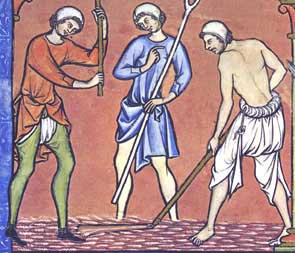Difference between revisions of "Braies"
From AmtWiki
m (change stub type) |
Weird Bird (talk | contribs) (→Links: - Fixed a dead link and added an additional YouTube link.) |
||
| Line 16: | Line 16: | ||
===Links=== | ===Links=== | ||
| − | *[ | + | *[https://web.archive.org/web/20161204092644/https://camelot-treasures.com/aenor/braies.pdf Making period braies] |
| + | *[https://www.youtube.com/watch?v=obJu8pvbASU Swordplay in Medieval Underpants] | ||
[[Category:Garb]] | [[Category:Garb]] | ||
[[Category:European Garb]] [[Category:Garb Bottoms]] | [[Category:European Garb]] [[Category:Garb Bottoms]] | ||
[[Category:Garb Undergarments]] | [[Category:Garb Undergarments]] | ||
Revision as of 00:47, 10 February 2024
Braies are a type of trouser that hung to the knees or mid-calf, similar to what we today call shorts. By the later middle ages, they were worn exclusively as undergarments, worn under hose or other forms of trousers.
In history
The 12th and 13th c. men's underwear, known as Braies or Breeches were a long legged full garment, shaped somewhat like pantaloons with a long flap at the top that is rolled down called the coulisse 14th C. Braies seam to have straight legs and less fabric, although they still roll down at the hips. The length also shortens later in period.
Braies are made of white linen, or wool for lower classes. Over the braies would be chausses, tied onto the braies at the hips.
